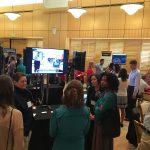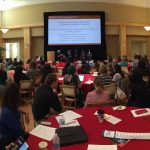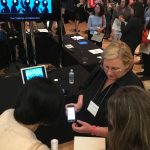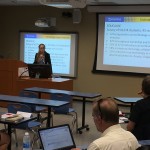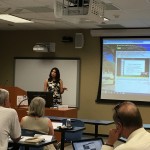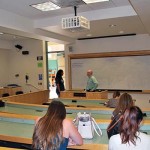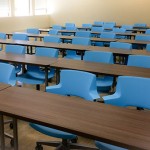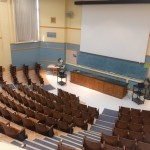- Emily Wughalter and colleagues presented a session on interactive display technology and teaching scholarly writing at the Academic Techology Expo on Oct. 2 at Stanford University. Photo: Klaus Trilck
- SJSU faculty, staff and students attended the Academic Technology Expo Oct. 2 where they share teaching methods with colleague from nearby universities. Photo: Klaus Trilck
- SJSU’s Linda M. Dunn-Jensen shares collaboration technology at the Academic Technology Expo Oct. 2. Photo: Klaus Trilck
On Oct. 2, San Jose State University faculty, staff and students joined colleagues from Stanford University, University of California, Berkeley, UC San Francisco, University of San Francisco, San Francisco State University, Santa Clara University and Saint Mary’s College of California at the Academic Technology Expo. The event provided a forum to share, discuss and promote effective practices for teaching and learning with technology. The Expo included a series of IdeaLab sessions and a student panel. The IdeaLab is a unique interactive session where presenters showcase practices, projects and technologies that are improving teaching and learning at participating institutions. Each presentation focused on a central teaching and learning challenge and how their solution might be adopted by other participants.
IdeaLab sessions included topics such as virtual reality, open education resources, writing activities, and student-centered approaches to communication, metacognition, and assessment that are enhanced by technology with eight teams of SJSU affiliates presenting throughout the day.
List of SJSU Presentations:
Presenters: David W. Parent
Presenters: Resa Kelly, Yingjie Liu
Presenters: Debra Caires, Isadora McCullough, Andrea Ulloa
Presenters: Marilyn Easter, Prabha Chandrasekar, Bobbi Makani
Presenters: Bryan Dang, Jeland Palicte, Colleen O’Leary-Kelley, Minh Tran
Presenters: Tianqin Shi, Jennifer Redd, Yingjie Liu
Presenters: Karin Jeffery, Ph.D., Emily Wughalter, Ed.D., Bethany Winslow
Presenters: Linda M. Dunn-Jensen, Prabha Chandrasekar
Additionally, Alora Frederick, Marketing ’18 with a minor in advertising, joined students from other participating campuses on a student panel. The discussion focused on teaching methods and tools used in courses. The panel provided an opportunity for students to share their experiences, thoughts and opinions on using different methods and tools.
For additional information about the event, visit the ATXpo website. For questions or for those interested in participating next year, please contact Jennifer Redd.
